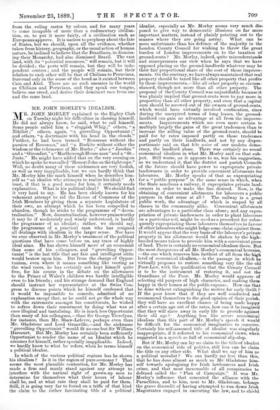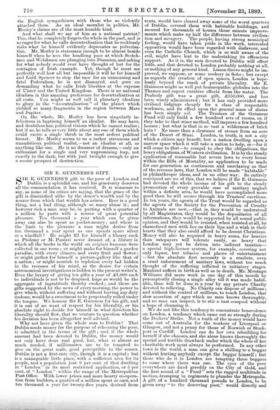MR. JOHN MORLEY'S IDEALISM.
MR. JOHN MORLEY explained to the Eighty Club on Tuesday night his difficulties in classing himself. He did not always know, he said, what to call himself. Some people calledhim a "sluggish Whig ;" others, "a Nihilist ;" others, - again, " a grovelling Opportunist ;" and others, " a doctrinaire with his head in the clouds." Further, he had been termed " Rousseau without the passion of Rousseau," and " a Burkite without either the wisdom or the vehemence of Mr. Burke ;" also a " Jacobin " and a " Girondist," a" Marlborough House man " and a " St.- Juste." He might have added that on the very evening on which be spoke he was called "Honest John on the tight rope." Well, no doubt many of these nicknames are very foolish, as well as very inapplicable, but we can hardly think that Mr. Morley hits the mark himself when he describes him- self as " an idealist who attempts to realise his ideal." At least, if that is a good name for him, it certainly needs explanation. What is his political ideal ? We should find it very hard to. say. He has been chiefly known for his vehement attempt to rid the House of Commons of the Irish Members by giving them a separate Legislature of their own, an attempt which he has been compelled to abandon, though he sticks to the programme of " decen- tralisation." Now, decentralisation, however praiseworthy it may be if moderately and wisely understood, is hardly the programme of an idealist ; rather, we should say, the programme of a practical man who has resigned all dealings with idealism in the larger sense. Nor have we ever observed in Mr. Morley's treatment of the political questions that have come before us, any trace of highly ideal aims. He has shown himself more of an economist than some of his colleagues, and " grovelling Oppor- tunist " is the last title that any fair and intelligent critic would bestow upon him. But from the charge of Oppor- tunism, even where it means something like veering as the wind veers, he has certainly not kept himself quite free, for his course in the debate on the allowances to the Prince of Wales's children was hardly intelligible even to his friends ; and his strange demand that England should instruct her representative at the Swiss Con- gress to discuss points which he himself confessed that it would be impossible to concede, admitted of no explanation except that, as he could not go the whole way with the extremists amongst his constituents, he wished to soften down their resentment by doing what was at once illogical and tantalising. He is much less Opportunist than many of his colleagues,—than Sir George Trevelyan, for instance, than Mr. Shaw-Lefevre, perhaps even than Mr. Gladstone and Lord Granville,—and the nickname " grovelling Opportunist" would fit no one but Sir William Harcourt. But Mr. Morley has certainly been sufficiently Opportunist to render the name of an Idealist which he assumes for himself, rather specially inapplicable. Indeed, we hardly know to what he refers, when be terms himself a political idealist.
In which of the various political regions has he shown his idealism ? Is it in the region of pure economy ? That seems the most plausible contention, for Mr. Morley has made a firm and manly stand against any attempt to interfere with the natural right of grown-up men to determine for themselves what their hours of labour shall be, and at what rate they shall be paid far them. Still, it is going very far to found on a trifle of that kind the claim to the rather fascinating title of a political idealist, especially as Mr. Morley seems very much dis- posed to give way to democratic illusions on far more important matters, instead of plainly pointing out to the masses where they are going astray. What can be more unfortunate than his defence of the majority in the London County Council for wishing to throw the great burden of London improvements on to the taxation of ground-rents ? • Mr. Morley, indeed, quite misunderstands and misrepresents our view when he says that we have opposed placing on the ground-landlords whatever may be their fair proportional share of the cost of those improve- ments. On the contrary, we have always maintained that real property should be taxed like all other property that profits by those improvements,—like all other property so circum- stanced, though not more than all other property. The proposal of the County Council was unjustifiable because it was plainly implied that ground-rents were to pay more in proportion than all other property, and even that a capital sum should be screwed out of the owners of ground-rents, which would have virtually involved confiscation, since during the unexpired terms of long leases, the ground- landlord can gain no advantage at all from the improve- ments. Improvements which are even more certain to multiply largely the gains of the great tradesmen than to increase the selling value of the ground-rents, should be paid for by rates imposed partly on those tradesmen and partly on their landlords, and not by any dispro- portionate raid on that bete noire of our modern demo- cracy, the landlord alone. There was certainly no sound economical idealism in what Mr. Morley said on that sub- ject. Still worse, as it appears to us, was his suggestion, as we understand it, that the district and parish Councils of the future should have power to expropriate private landowners in order to provide convenient allotments for labourers. Mr. Morley speaks of that as expropriating for a " public purpose" in the same sense in which, when the State sanctions a railway, it expropriates private land- owners in order to make the line desired. Now, is the obtaining of convenient allotments for labourers a public purpose in that sense at all ? The railway is a great public work, the advantage of which is reaped by all classes in the community alike. Convenient allotments are advantages to a particular class alone ; and any expro- priation of private landowners in order to plant labourers on a particular soil, might be used as a precedent for subse- quently expropriating those labourers themselves in favour of other labourers who might lodge some claim against them. It would appear that the very basis of the labourer's private property in his allotment would be shaken by the high- handed means taken to provide him with a convenient piece of land. There is certainly no economical idealism there. But the most dangerous of all Mr. Morley's economical heresies, —the one which removes him farthest of all from the high level of economical idealism,—is the passage in which he virtually proposes to restore something very like the old Poor-Law, with the qualification that the County Council is to be the instrument of restoring it, and, not the Guardians of the Poor. Mr. Morley would approve of selecting old paupers of high character, and making them happy in their homes at the public expense. How can that be done without extinguishing the motive for early thrift ? If the poor know that if they are well conducted and recommend themselves to the good opinion of their parish, they will have an excellent chance of being made happy after a certain age out of the rates, how .can it be imagined that they will slave away in early life to provide against their old age ? Anything less like severe economical idealism than this part of Mr. Morley's speech it would be difficult for the economical imagination to conceive. Certainly his self-assumed title of idealist was singularly inappropriate, if it referred to his economical views, when suggested in a speech so full of economical slip-slop.
But if Mr. Morley can lay no claim to the title of idealist on the economical side of politics, still less can he claim the title on any other side. What shall we say of him as a political moralist ? We can hardly say less than this, that he has done almost as much as Mr. Gladstone him- self towards apologising for Irish lawlessness and Irish crime, and that most inexcusable of all conspiracies to defraud called the " Plan of Campaign." It was Mr. Morley's influence that cemented the alliance with the Parnellites, and to him, next to Mr. Gladstone, belongs the grave discredit of having attempted to run down Irish Magistrates engaged in executing the law, and to shield the English sympathisers with those who so violently attacked them. As an ideal moralist in politics, Mr. Morley's claims are of the most humble kind. And what shall we say of him as a national patriot? This, that he completely forgets the whole in the part, and is so eager for what he calls decentralisation that he recklessly risks what he himself evidently deprecates as pulverisa- tion. Mr. Morley is statesman enough to be almost beside himself when he sees the headlong pace at which Scotch- men and Welshmen are plunging into Disunion, and asking for what nobody would ever have thought of but for the contagion of Irish example. Yet, though he must see perfectly well how all but impossible it will be for himself and Lord Spencer to stop the race for an unmeaning and fatal Federalism, he is not dismayed, and goes on demanding what he calls Irish liberties at the expense of Ulster and the United Kingdom. There is no national idealism in this amazing preference for decentralisation at all costs. You might as well call it planetary idealism to glory in the " decentralisation" of the planet which yielded so many fragments in the region between Mars and Jupiter. On the whole, Mr. Morley has been singularly in- felicitous in baptising himself an idealist. He may have, and doubtless has, political visions which he cannot realise ; but if so, he tells us very little about any one of them which could excite a single throb in the most ardent political breast. Mr. Morley seems to us a rather strenuous and unambitious political realist,—not an idealist at all, or anything like one. He is no dreamer of dreams,—only an enthusiast for a single and very unpromising leap, not exactly in the dark, but with just twilight enough to give a secure prospect of destruction.







































 Previous page
Previous page